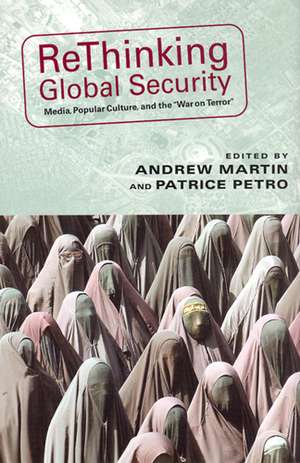Rethinking Global Security: Media, Popular Culture, and the "War on Terror": New Directions in International Studies
Editat de Andrew Martin, Patrice Petro Autor Wendy Kozol, Marcus Bullock, James Castonguay, Mary Layoun, Rebecca Decola, Patricia Mellencamp, Tony Grajeda, Mike Allen, Robert Ricigliano, Doug Davis, Lisa Parksen Limba Engleză Paperback – 28 apr 2006
Analysts today routinely look toward the media and popular culture as a way of understanding global security. Although only a decade ago, such a focus would have seemed out of place, the proliferation of digital technologies in the twenty-first century has transformed our knowledge of near and distant events so that it has become impossible to separate the politics of war, suffering, terrorism, and security from the practices and processes of the media.
This book brings together ten path-breaking essays that explore the ways our notions of fear, insecurity, and danger are fostered by intermediary sources such as television, radio, film, satellite imaging, and the Internet. The contributors, from a wide range of disciplines, show how both fictional and fact-based threats to global security have helped to create and sustain a culture that is deeply distrustful. Topics range from the Patriot Act, to the censorship of media personalities, to the role that television programming plays as an interpretative frame for current events.
Designed to promote strategic thinking about the relationships between media, popular culture, and global security, this book is essential reading for scholars of international relations, technology, and media studies.
This book brings together ten path-breaking essays that explore the ways our notions of fear, insecurity, and danger are fostered by intermediary sources such as television, radio, film, satellite imaging, and the Internet. The contributors, from a wide range of disciplines, show how both fictional and fact-based threats to global security have helped to create and sustain a culture that is deeply distrustful. Topics range from the Patriot Act, to the censorship of media personalities, to the role that television programming plays as an interpretative frame for current events.
Designed to promote strategic thinking about the relationships between media, popular culture, and global security, this book is essential reading for scholars of international relations, technology, and media studies.
Preț: 187.23 lei
Preț vechi: 255.79 lei
-27% Nou
Puncte Express: 281
Preț estimativ în valută:
35.83€ • 37.27$ • 29.58£
35.83€ • 37.27$ • 29.58£
Carte indisponibilă temporar
Doresc să fiu notificat când acest titlu va fi disponibil:
Se trimite...
Preluare comenzi: 021 569.72.76
Specificații
ISBN-13: 9780813538303
ISBN-10: 0813538300
Pagini: 258
Ilustrații: 24
Dimensiuni: 152 x 229 x 20 mm
Greutate: 0.45 kg
Ediția:None
Editura: Rutgers University Press
Colecția Rutgers University Press
Seria New Directions in International Studies
ISBN-10: 0813538300
Pagini: 258
Ilustrații: 24
Dimensiuni: 152 x 229 x 20 mm
Greutate: 0.45 kg
Ediția:None
Editura: Rutgers University Press
Colecția Rutgers University Press
Seria New Directions in International Studies
Notă biografică
Andrew Martin is an associate professor and chair of the English department at the University of Wisconsin, Milwaukee. Patrice Petro is a professor and director of the Center for International Education at the University of Wisconsin, Milwaukee.
Recenzii
The relationship between security policy and popular and public culture has changed dramatically over the last ten years, a change that calls out for probing critical attention. This timely collection pointedly responds to the need for genuine interdisciplinary engagement with such current issues. Its essays are excitingly original and sophisticated, providing analyses long overdue.
Descriere
In Rethinking Global Security , Andrew Martin and Patrice Petro bring together ten path-breaking essays that explore the ways that our notions of fear, insecurity, and danger are fostered by intermediary sources such as television, radio, film, satellite imaging, and the Internet. The contributors, who represent a wide variety of disciplines, including communications, art history, media studies, women's studies, and literature, show how both fictional and fact-based threats to global security have helped to create and sustain a culture that is deeply distrustful-of images, stories, reports, and policy decisions. Topics range from the Patriot Act, to the censorship of media personalities such as Howard Stern, to the role that Buffy the Vampire Slayer and other television programming play as an interpretative frame for current events.













